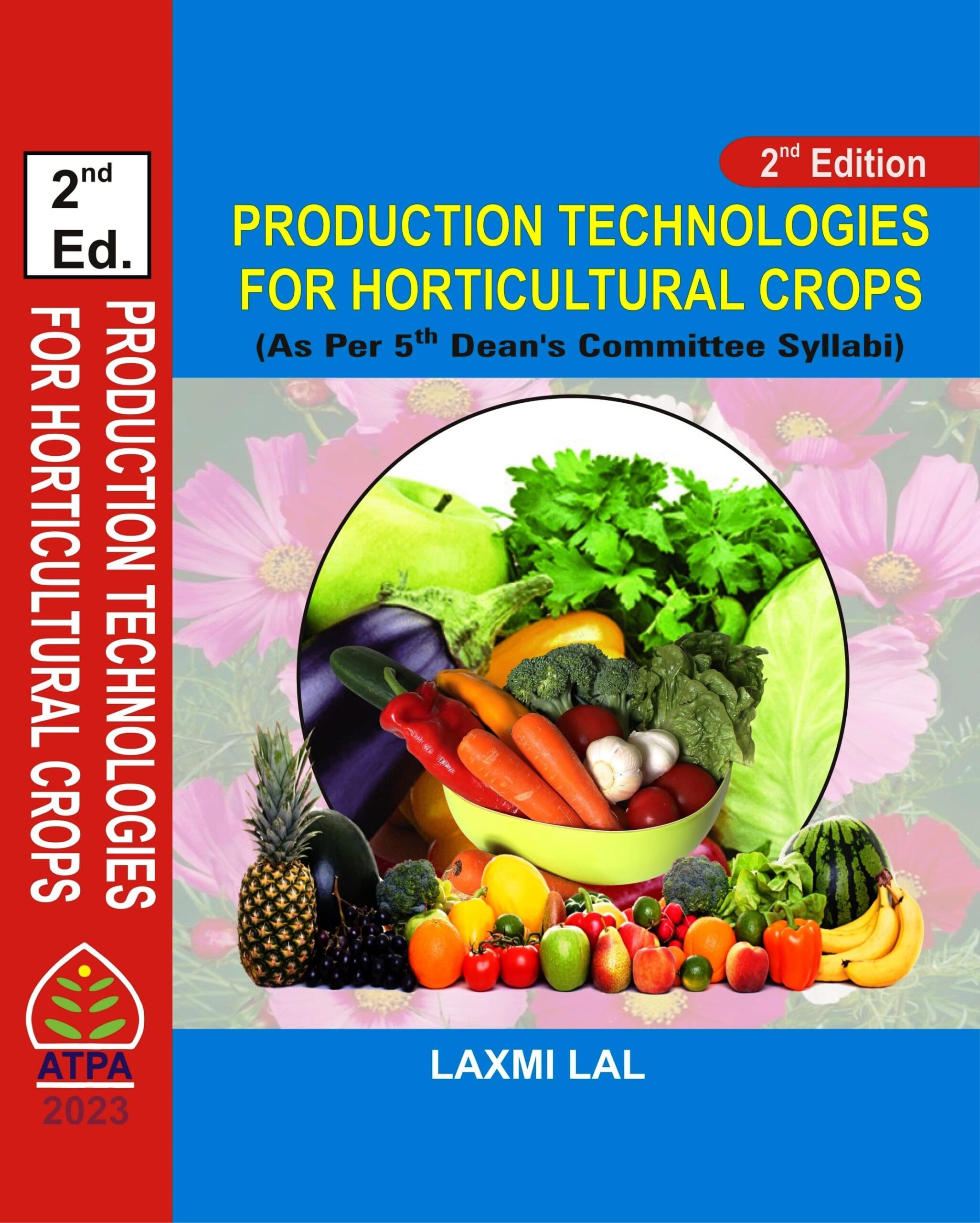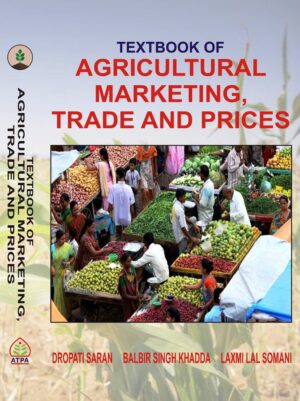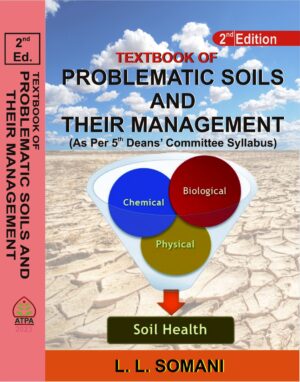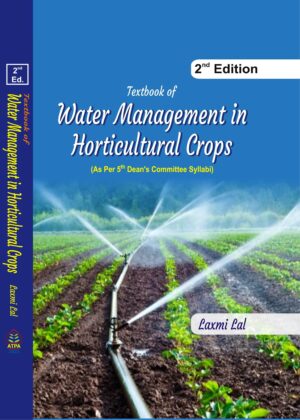TEXTBOOK SERIES PRODUCTION TECHNOLOGIES FOR HORTICULTURAL CROPS
₹1,925.00
AUTHORS: LAXMI LAL
PUBLISHING YEAR: 2023
EDITION: 2nd
ISBN: 9789394777835
© All Rights Reserved
Description
ABOUT THE BOOK
Importance of horticulture in India cannot be overemphasized. Its contribution in nutritional security and economic prosperity is well established. Horticultural crops are high value commercial crops, produce higher yields and income per unit area with enormous employment potential. Recently several changes have taken place after the acceptance of liberalization policy and WTO provisions which have necessitated the need for competitiveness in the world trade market with respect to horticultural crops having potential for export. Looking to change of emphasis ICAR, constituted 5th Dean’s Committee to recast appropriate course curriculum and syllabi for different areas of horticulture including fruits and plantation crops at undergraduate and post-graduate levels. In continuation of this exercise, it was pertinent to develop relevant literature on Production Technology of Fruits and plantation crops. To fulfil the requirement of this course for B.Sc. (Hort.) degree, this book entitled “Production Technologies for Horticultural Crops” is being brought out.
This book has been divided into three parts. First part on Production technology of fruit crops This part of the book deals briefly with latest cultivation techniques of commercial fruits of India such as mango, banana, citrus, grape, guava, litchi, papaya, sapota, apple, pear, peach, walnut, almond and; minor fruits- date, ber, pineapple, pomegranate, jackfruit, strawberry. The second part deals with the cultivation practices of vegetable crops viz potato, brinjal, tomato, chilli, onion, okra, cabbage, cauliflower, musk melon, water melon, cucumber and leafy vegetables. The third part is devoted to the cultivation of important commercial flower crops viz., Rose, chrysanthemum, gladiolus, marigold, gerbera, carnation, lilium, jasmine, anthurium and orchids
Besides, promotion of these crops helps in poverty – alleviation particularly in rural areas by providing employment opportunity to rural people. Basically, this book has been written with undergraduate students of horticulture in colleges and universities in mind but it will also equally suit the requirements of practitioners and preachers of horticulture on scientific lines.
CONTENT
| S. No | Title | Page No. | ||
| Preface | 3-4 | |||
| About the Book | 6 | |||
| About the Authors | 8 | |||
| PART-1: FRUIT CROPS | ||||
| 1 | Introduction | 13-23 | ||
| 2 | Classification of Fruit Crops | 24-32 | ||
| 3 | Climatic Requirement
|
33-37 | ||
| 4 | Selection of Site | 38-41 | ||
| 5 | Fencing and Wind Break | 42-54 | ||
| 6 | Lay Out and Planting Systems | 55-71 | ||
| 7 | Plant Propagation | 72-107 | ||
| PRODUCTION TECHNOLOGY OF IMPORTANT TROPICAL, SUB TROPICAL AND TEMPERATE FRUIT CROPS | ||||
| 8 | Mango | 108-110 | ||
| 9 | Banana | 111-114 | ||
| 10 | Citrus | 115-124 | ||
| 11 | Grape | 125-136 | ||
| 12 | Guava | 137-140 | ||
| 13 | Sapota | 141-143 | ||
| 14 | Litchi | 144-148 | ||
| 15 | Papaya | 149-152 | ||
| 16 | Pineapple | 153-154 | ||
| 17 | Pomegranate | 155-159 | ||
| 18 | Jackfruit | 160-161 | ||
| 19 | Ber | 162-164 | ||
| 20 | Date Palm | 165-169 | ||
| 21 | Annona | 170-171 | ||
| 22 | Apple | 172-177 | ||
| 23 | Pear | 178-181 | ||
| 24 | Peach | 182-186 | ||
| 25 | Walnut | 187-188 | ||
| 26 | Almond | 189-190 | ||
| 27 | Bael | 191-192 | ||
| 28 | Amla Indian Goose Berry (or) Aonla | 193-194 | ||
| 29 | Fig | 195-196 | ||
| PART-2 : VEGETABLE CROPS | ||||
| 30 | Importance of Vegetable Cultivation for Nutritional Security | 199-216 | ||
| 31 | Classification of Vegetabeles | 217-220 | ||
| PRODUCTION TECHNOLOGY OF IMPORTANT VEGETABLE CROPS | ||||
| 32 | Potato | 221-226 | ||
| 33 | Brinjal | 229-236 | ||
| 34 | Tomato | 237-243 | ||
| 35 | Chilli | 244-248 | ||
| 36 | Onion | 249-252 | ||
| 37 | Okra | 253-257 | ||
| 38 | Cabbage | 258-263 | ||
| 39 | Cauliflower | 264-266 | ||
| 40 | Muskmelon | 267-268 | ||
| 41 | Water Melon | 269-271 | ||
| 42 | Cucumber | 272-274 | ||
| 43 | Leafy Vegetables | 275-280 | ||
| PART-III FLOWER CROPS | ||||
| 44 | Status and Scope of Floriculture | 283-295 | ||
| PRODUCTION TECHNOLOGY OF COMMERCIAL FLOWER CROPS | ||||
| 45 | Rose | 296-303 | ||
| 46 | Chrysanthemum | 304-313 | ||
| 47 | Gladiolus | 314-324 | ||
| 48 | Marigold | 325-330 | ||
| 49 | Gerbera | 331-337 | ||
| 50 | Carnation | 338-344 | ||
| 51 | Lilium, | 345-348 | ||
| 52 | Jasmine | 349-353 | ||
| 53 | Anthurium | 354-356 | ||
| 54 | Orchids | 357-361 | ||
| 55 | Tuberose | 362-365 | ||
| Literature cited | 366-368 | |||
ABOUT THE AUTHOR
LAXMI LAL Somani is Retired Director Resident instructions, MPUAT, Udaipur. He went To Waite Agricultural Research Institute, Adelaide, Australia for undertakinf post-doctoral work (1975-77). He has over 400 research and technical articles to his credit. He has authored/edited over 165 scholarly books in various fields of agriculture. Prof. Somani has been honored with several academic excellence awards for his outstanding achievements. He has been honoured by University merit Award, Dhiru Morarji Memorial prize and Vijay Shree). The world development parliament also honored him with honorary award DOCTOR OF SCIENCE.
Additional information
| AUTHOR/AUTHORS | LAXMI LAL |
|---|---|
| PAGES | 368 |
| BINDING | Hard Back |
| PUBLICATION YEAR | 2023 |





